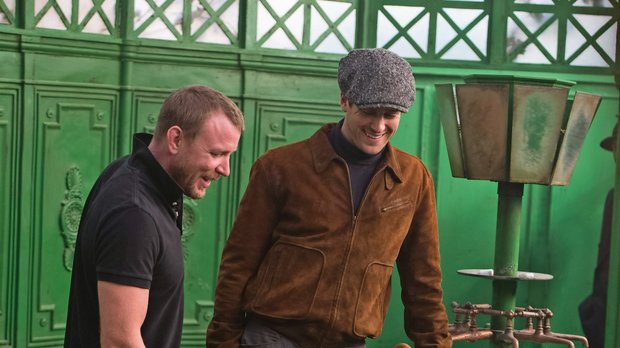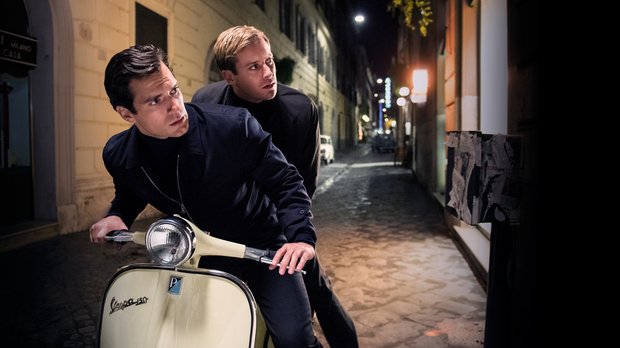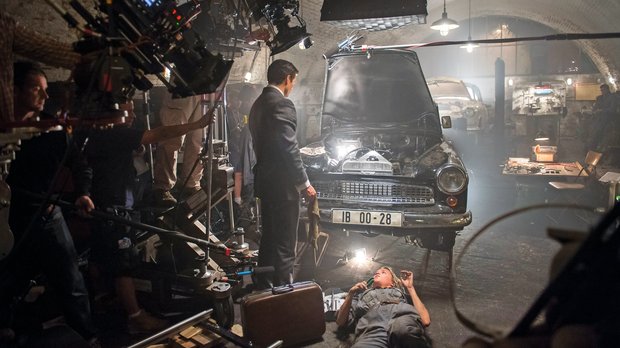Guy Ritchie on remaking The Man From UNCLE for film
Name a suave, lethal superspy who sprung from the mind of Ian Fleming. A Martini-cool ladykiller, sharp of suit and shot; a globe-hopping secret agent who defined the glittering, outrageous world of ’60s spy capers. Too easy? There’s one proviso. If your answer contains the words James or Bond you will be diced with a laser and fed to the sharks. No cheating now…
Napoleon Solo is Fleming’s other great contribution to the espionage game, brought to deadly, dapper life by Robert Vaughn in hit TV show The Man From UNCLE. Teamed with David McCallum as taciturn, Beatle-mopped Soviet operative Illya Kuryakin, Solo fought the Cold War on the small screen while 007 ruled the big. Now the mismatched agents of the United Network Command for Law and Enforcement are back, reactivated for a blockbuster mission by Guy Ritchie and Lionel Wigram, the director/producer team behind Sherlock Holmes’ reinvention as a brawling Baker Street bohemian with an uncanny resemblance to Robert Downey Jr.

“Warner Bros came to us with a list of projects after Sherlock Holmes,” says Wigram as SFX meets the filmmaking duo in a sun-flooded Rome, suitably Euro-glam setting for some of the movie’s key sequences. “We looked at Man From UNCLE and thought, ‘Hmm, we’ve always wanted to do a spy movie. And this is interesting because instead of a solo agent – instead of Jason Bourne or James Bond or Harry Palmer, your typical lone spy – it’s two agents. There’s a story behind it – a Russian and an American teaming up. It feels like an opportunity here to do something different in the spy genre, but still do a ’60s spy movie, an homage to the Sean Connery James Bonds, to the Harry Palmers, to all those great movies.’”
The studio had struggled to reboot the UNCLE franchise for over 20 years, developing and discarding a multitude of drafts and visions. The project tore through helmers as diverse as Quentin Tarantino and Steven Soderbergh, wooed and lost A-listers from Tom Cruise to George Clooney. Did that feel like two decades of intensive research and development?
“No, it was a completely clean slate,” says Ritchie, a bullish, mischievous presence next to the urbane and affable Wigram. “And actually I was completely unaware that anyone was ever after it! It’s only relatively recently that I found out, when the first trailer came out, and people told me – I never knew anyone else was attached to it! We did inherit a script but there was nothing we could do with it, so we threw that in the bin and started again.”

“I was an executive at Warner Bros and I read various drafts over the years,” adds Wigram, “and it’s understandable why they weren’t made. Some very respectable filmmakers, but for some reason I don’t think they ever quite understood the ’60s spy genre. We grew up on those movies as kids. We watched them time and time again. We’re completely immersed in it. It was our natural language. They say write what you know. Well, we know that genre really well. We didn’t have to think about it. Yes, we did the research. We did the research when we were 12, watching James Bond over and over again.”
While Bond has strolled coolly into the 21st century, Ritchie and Wigram were determined to preserve UNCLE’s retro trappings: the razor-edged, Rat Pack tailoring, jet-age Pan Am glamour and the kind of high-stakes, high-style outrageousness that can only safely be contained within the perimeters of the 1960s. “We had a ten-minute conversation about being contemporary,” shares Ritchie. “It didn’t go any further than that. Everybody else was doing contemporary stuff and we quite fancied period.”
Get sneak previews, exclusive competitions and details of special events each month!
“We were pretty much clear that we didn’t want to do it if we couldn’t do it in the ’60s,” adds Wigram. “The period is so rich in terms of storytelling. It’s a great world, in terms of style, the story, what’s going on in the world.”
“It made it exotic, for all sorts of reasons,” says Ritchie, who relished the decade’s visual possibilities. “I like to be transported into a fantasy when I go to the cinema. So I’m more sympathetic to period than I am to the realism of the contemporary world – that’s just not for me. I’d rather be off-centre. It’s easier to create a world.” But don’t expect Ritchie to replicate the iconography of the TV show. “No, there was nothing I wanted to pick up on visually. What interested me was that the show captured a tone. Some of that informed this film and some of it didn’t, but just the title The Man From UNCLE is kind of a cool title. The idea that you’ve got a Russkie and an American who have to get on is just a great idea – and after that it’s open season.”
The Man From UNCLE is released in the UK on 14 August
"How is it that just after the Cuban Missile Crisis a Russian and an American have to team up? We thought it would be interesting to tell that story."
So no triangular UNCLE ID badges? No nifty communicator pens? “I do quite like some of the communicator pens,” Ritchie grins. “So some of the technology was important. You think, ‘Oh, I’ll take that and leave that, that’ll work and that won’t work…’ Obviously we left a lot of stuff behind. We did have UNCLE HQ written in at one point. We went quite large on the HQ. It just didn’t feel like it was part of the movie. I’m glad we didn’t. It felt like it was another ending, stuck on the ending.”
“And we wanted to do the origin story,” adds Wigram. “We wanted to do the birth of UNCLE. If we do a sequel maybe there will be triangular badges!” Also absent is UNCLE’s eternal nemesis THRUSH, the evil cabal whose fearsome name is now more likely to be whispered in chemists than behind the doors of the intelligence community. Did Ritchie not believe he could bring them to the screen with a straight face? “Yeah, that’s the problem,” he smiles. “I’m not sure if THRUSH meant the same thing in the ’60s. You’re right, you can’t have THRUSH anymore.”
As Wigram pitches it, this is UNCLE Begins – the secret origin we never saw. “We used the TV show as our basic inspiration. In the show the UNCLE organisation already exists and Napoleon Solo and Illya Kuryakin, a Russian and an American, are working together in this sort of United Nations of agencies… and you never understand why. It’s in the ’60s, at the height of the Cold War. How is it that just after the Cuban Missile Crisis a Russian and an American have to team up? We thought it would be interesting to tell that story.”

The movie recruits Solo and Kuryakin for their inaugural mission, investigating the case of a vanished German scientist and a dastardly scheme threatening the balance of nuclear power. The uneasy partners are played by Henry Cavill and Armie Hammer, whose chemistry, you imagine, was crucial. “Yeah, it was,” says Ritchie, “but that took care of itself. Films take on a momentum of their own, and it was clear that you would want them to get on. Eventually you realise that they fell out of the same tree, just from different orchards. It was about recognising the similarity of their tone.”
Wigram promises a film that’s “funny but not a spoof”. Given its breezy, sardonic tone, how does Ritchie keep the sense of threat and peril feeling real? “That’s a good question. At what point do you go too broad and it undermines your stakes? And at what point do you take yourself too seriously and lose a form of entertainment? That’s an ongoing creative battle. It’s really a question of keeping a muzzle on the humour. I’m always encouraged to put more humour in, but I don’t want to, because, invariably, you lose the stakes.
“On the whole the scripts we write are written seriously,” Ritchie continues, “and then I allow humour to creep in on the day. Invariably what happens is we realise we can make something more entertaining. Honestly, my biggest battle is to stop [the cast] being funnier. That is a whole wrestling match. The instinct is there to make it funny, and I’ve just got to hold that back as much as I can.”

The Man From UNCLE follows Kingsman: The Secret Service, another movie that restored a much-missed wink to the spy genre. Even Sam Mendes promises that SPECTRE, Bond’s next adventure, will have “mischief”. Is this a post-Bourne backlash? Are audiences hungering for a lighter, wittier take on big-screen espionage? “It’s a complete coincidence,” says Ritchie. “[Matthew] Vaughn, who made Kingsman, is my ex-partner, and we know each other very well. We shot our films at the same time – he was in the studio next door – and I had no idea that he was making the tone that he was making. And he had no idea I was making the tone I was making. It was just one of those things. It just seemed to happen. Who knows, Kingsman’s been very successful, financially, and I’m sure they’ll end up doing another one of those. Maybe there is an appetite for that. Bond’s got more and more serious. There’s plenty of room for that and maybe there’s room for this.”
UNCLE’s resurrection takes inspiration from cinema history in other ways – and not just the fact that a helicopter in the film is the very one Pussy Galore flew in Goldfinger (“There’s only one geezer in the world who can fly it,” says Ritchie, amazed). While its makers namecheck the European masterpieces of Fellini and Antonioni, they’re equally happy geeking out about mid-’60s Bond knock-offs, all those glossy continental adventures set in what Ian Fleming called “thrilling cities”.
“Everyone wanted to go to Naples and Rome,” says Ritchie of the film’s camera-bait locations. “We fell in love with both cities, actually. But again that’s of the genre. It needed to feel quite pan-European. We looked at all the different cities in Europe and thought ‘Which one’s got the best food?’… And that was that!” And if they win a sequel, and have a chance to pin those triangular ID badges on Cavill and Hammer, where would they next assign their heroes? Ritchie glances at Wigram. “Where’s the next place we want to visit? We’ll go to Istanbul next time…”
“That’s where we’re thinking.” Are they just looking at menus? Ritchie laughs. “It’s either menus or wine lists…”You sense that Napoleon Solo would approve.

Nick Setchfield is the Editor-at-Large for SFX Magazine, writing features, reviews, interviews, and more for the monthly issues. However, he is also a freelance journalist and author with Titan Books. His original novels are called The War in the Dark, and The Spider Dance. He's also written a book on James Bond called Mission Statements.


